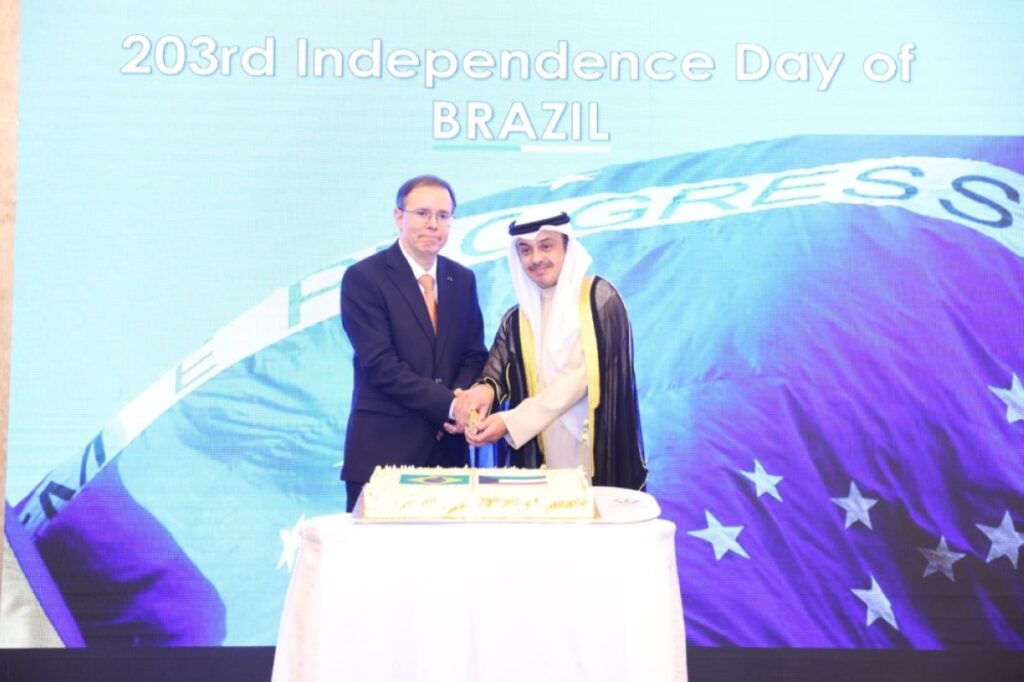KUWAIT: Brazilian Ambassador to Kuwait Rodrigo d’Araujo Gabsch reaffirmed on Sunday that Brazil and Kuwait enjoy a “strong and reliable partnership” across multiple sectors — particularly energy, food security and investment — as the two countries mark five decades since opening resident embassies in each other’s capitals. In his opening remarks at a reception celebrating Brazil’s 203rd Independence Day at the Regency Hotel, Ambassador Gabsch said bilateral ties continue to expand in scope and significance, supported by active diplomacy, growing trade and ongoing negotiations on new agreements to modernize the legal framework between the two nations.
Nawaf Al-Ahmad, Assistant Foreign Minister for the Americas, attended the event as the chief guest, while ambassadors, heads of diplomatic missions Kuwaiti dignitaries and members of the Brazilian community also joined the celebration. Gabsch noted that 2025 has been a year of positive momentum in Kuwait-Brazil relations, highlighted by high-level visits and business delegations from both the public and private sectors. These interactions, he said, have helped diversify trade, strengthen cooperation in food and energy security, and pave the way for new opportunities in investment and technology.
“Brazil and Kuwait have been reliable partners for more than half a century, and we are committed to further deepening this friendship,” he said. “I am happy to report that we are moving forward with the negotiation of several bilateral agreements that will update the legal framework between our nations and further consolidate a friendship that has developed over more than half a century,” he added.

Brazilian Ambassador Rodrigo d’Araujo Gabsch delivers his opening remarks.

Nawaf Al-Ahmad (second right) and Ambassador Gabsch (right) pose for a photo.

Guests pose for a group photo.
The ambassador also commemorated the 50th anniversary of the establishment of resident embassies in Brasilia and Kuwait — a milestone following the launch of diplomatic relations in 1967. “Fifty years ago, on July 31, 1975, Talib Jalal Al-Din Al-Nakeeb was received by President Ernesto Geisel as the Ambassador of Kuwait with residence in Brasilia. A few months later, on November 9, at Seif Palace, Paulo Henrique de Paranagua presented his credentials to HH the Amir Sheikh Sabah Al-Salem Al-Sabah as the resident Ambassador of Brazil in Kuwait,” he said.
He added that bilateral relations “continue to flourish” and remain anchored in mutual respect and shared aspirations. “Those fifty years are a nice round date that we also celebrate tonight, in honor of all those who came before us and paved the way for the relations that Kuwait and Brazil now enjoy. May they continue to flourish in the next fifty years and beyond,” he said, paying tribute to the early diplomats who laid the foundations for today’s partnership.
Climate initiative
Turning to Brazil’s global role, Gabsch highlighted his country’s leadership as host and president of COP30, the 30th UN Climate Conference currently underway in Belem, deep in the Amazon. He described President Luiz Inacio Lula da Silva’s decision to hold the summit in the heart of the rainforest as a meaningful reminder of the world’s dependence on tropical forests in the fight against climate change. He outlined Brazil’s efforts to build consensus on key climate priorities — including just energy transitions, climate finance, and the human and social dimensions of climate action — while introducing new Brazilian-led initiatives such as the “Tropical Forests Forever” facility, an investment mechanism for forest conservation to which Brazil has already pledged $1 billion.
“At a time of global complexity, a successful COP30 will demonstrate the crucial importance of collective multilateral action — something Kuwait also strongly supports,” he said. Reflecting on Brazil’s national history, the ambassador recalled the decisive events of 1822, when Brazil declared independence after rejecting orders from Lisbon that would have reduced the territory back to colonial status. That moment, he said, remains central to Brazil’s identity and symbolizes the country’s long-standing commitment to sovereignty, development and international cooperation.

